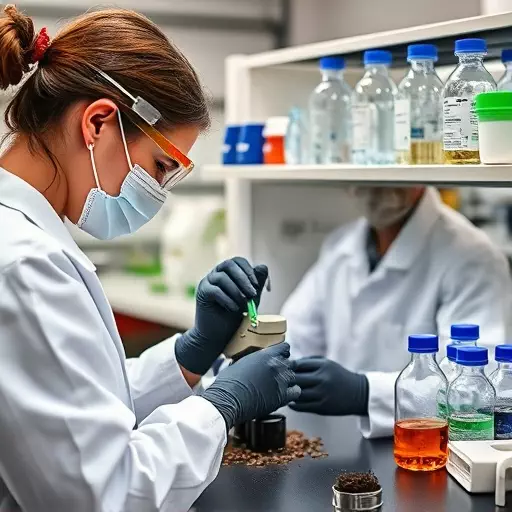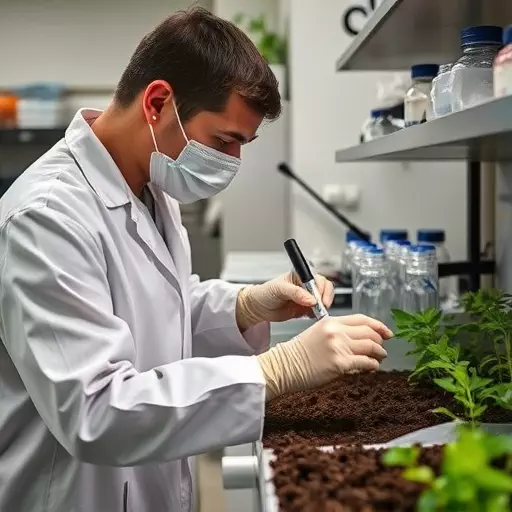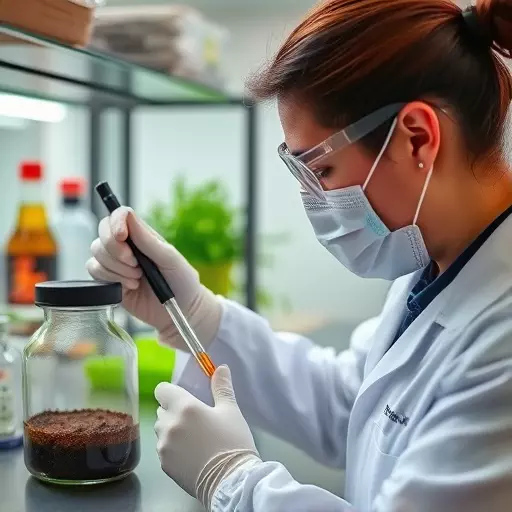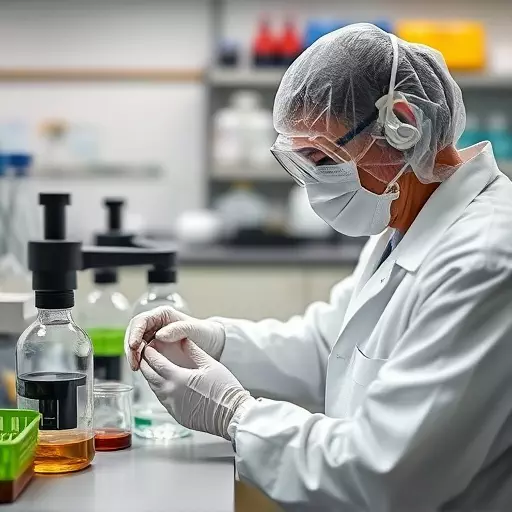Environmental laboratories in Warren-Troy-Farmington Hills and surrounding areas are vital for safeguarding aquatic ecosystems. They employ advanced techniques like forensic isotope analysis to uncover pollutants and monitor biological indicators, offering critical insights for management strategies. Agricultural labs test soil health, optimizing crop production while minimizing environmental impact. Integrating lab data from various sources, including forensic soil health testing and water quality analysis, provides a comprehensive view of the environment, enabling tailored protection and sustainable development strategies. This localized research significantly contributes to both environmental conservation and criminal investigations through its expertise in isotope analysis.
Water quality assessment is a cornerstone of environmental protection. Labs play a pivotal role in this process by providing comprehensive data and advanced analyses crucial for understanding and mitigating pollution. This article explores the diverse ways laboratories contribute to our environment, from local initiatives like lab work in Warren-Troy-Farmington Hills to cutting-edge forensic applications like isotope analysis in crime solving. We delve into soil health testing in agricultural labs as a strategy for optimizing crop yield and promoting sustainability, highlighting the integrated approach needed for effective environmental protection strategies.
- The Role of Labs in Water Quality Assessment: A Comprehensive Overview
- Lab Work in Warren-Troy-Farmington Hills: Understanding Local Environmental Needs
- Forensic Applications of Isotope Analysis: Unlocking Criminal Mysteries with Science
- Soil Health Testing in Agricultural Labs: Optimizing Crop Yield and Sustainability
- Integrating Lab Data for Effective Environmental Protection Strategies
The Role of Labs in Water Quality Assessment: A Comprehensive Overview

In the realm of environmental protection, laboratories play a pivotal role in assessing water quality. These facilities employ specialized equipment and expertise to conduct thorough analyses, ensuring that our aquatic ecosystems remain healthy and vibrant. Through lab work in Warren-Troy-Farmington Hills and beyond, researchers can uncover intricate details about water bodies, from identifying pollutants to monitoring biological indicators. The process involves a suite of advanced techniques, including forensic applications of isotope analysis, which have proven invaluable in crime solving. By tracing the origin and movement of contaminants, these methods provide crucial insights for effective management strategies.
Moreover, agricultural labs are not just focused on crop yield; they also play a significant part in testing soil health. This aspect is essential for optimizing crop production while minimizing environmental impact. Isotope analysis, for instance, can reveal critical information about nutrient cycling and soil fertility, guiding farmers to make informed decisions. Integrating such lab-based assessments into environmental protection strategies helps maintain the delicate balance of our ecosystems, fostering sustainability for future generations.
Lab Work in Warren-Troy-Farmington Hills: Understanding Local Environmental Needs

In the heart of Warren-Troy-Farmington Hills, lab work plays a pivotal role in understanding and addressing local environmental needs. These facilities serve as hubs for comprehensive assessments, employing advanced techniques like forensic applications of isotope analysis, which extend beyond crime solving to environmental monitoring. By analyzing water samples, soil health in agricultural labs, and other ecological indicators, researchers and scientists gain crucial insights into the region’s unique ecosystem.
This localized focus on lab work enables tailored strategies for environmental protection. For instance, testing soil health can reveal nutrient deficiencies or excesses, guiding crop optimization practices that enhance agricultural sustainability. Similarly, water quality assessments help identify sources of pollution, enabling targeted interventions to preserve and restore the area’s natural resources for future generations.
Forensic Applications of Isotope Analysis: Unlocking Criminal Mysteries with Science

In the realm of environmental protection, lab work plays a pivotal role, particularly when it comes to unraveling criminal mysteries through forensic applications of isotope analysis. This scientific technique has emerged as a powerful tool in the hands of investigators, offering insights that can solve complex cases. By studying the isotopes present in various samples, such as water, soil, and plant tissues collected from agricultural labs in Warren-Troy-Farmington Hills, experts can uncover crucial information. For instance, analyzing soil health through these methods aids in optimizing crop growth while also providing leads in environmental crimes.
Isotope analysis has proven its mettle in crime solving, enabling investigators to trace the origin of substances, establish timelines, and even identify individuals. This precision is invaluable for forensic science, offering a level of detail that complements traditional evidence collection. As such, labs in this region contribute significantly to both environmental stewardship and criminal investigations, utilizing their expertise in isotope analysis to serve justice while safeguarding our surroundings.
Soil Health Testing in Agricultural Labs: Optimizing Crop Yield and Sustainability

In agricultural settings across Warren, Troy, and Farmington Hills, labs play a pivotal role in advancing sustainable farming practices through detailed soil health testing. This process involves analyzing various soil parameters such as nutrient levels, pH balance, and organic matter content using advanced techniques like forensic applications of isotope analysis. By employing these scientific methods, farmers can make informed decisions to optimize crop yields while minimizing environmental impact.
Testing soil health in agricultural labs allows for precise adjustments in fertilization strategies, irrigation management, and crop rotation schedules. This data-driven approach ensures that farming practices are tailored to the specific needs of each field, promoting healthier crops and reducing the use of unnecessary chemicals. Moreover, the insights gained from lab work contribute to long-term sustainability goals by preserving soil fertility and mitigating potential environmental hazards associated with intensive agriculture.
Integrating Lab Data for Effective Environmental Protection Strategies

In the context of environmental protection, integrating lab data from various sources is a game-changer. Labs conducting work in Warren-Troy-Farmington Hills and beyond play a vital role in this strategy. By combining results from forensic applications of isotope analysis—used to solve crimes with precision—with traditional water quality testing methods, environmental scientists can gain deeper insights into ecosystem health. This integrated approach allows for more effective protection strategies, as it offers a holistic view of the environment, from soil health in agricultural labs to water purity in urban areas.
For instance, testing soil health in agricultural labs through advanced forensic techniques can reveal nutrient deficiencies or contamination levels that might be missed by conventional methods alone. Similarly, lab work focused on water quality can identify subtle changes in mineral content or organic pollutants, enabling prompt action to optimize crop growth and preserve local ecosystems. This integration ensures a more comprehensive understanding of the environment, ultimately fostering better-informed protection strategies.
